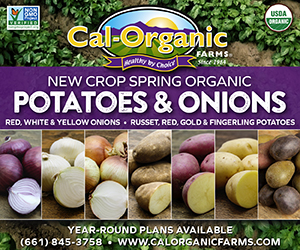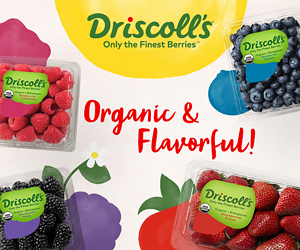OPN sat down with Dr. James Richard Greenwood, the newly appointed environmental protection and resource conservation seat on the National Organic Standards Board (NOSB). Dr. Greenwood, who goes by Rick, is a scientist and organic avocado farmer in San Diego County, California. He previously served on the board of directors for the USDA Hass Avocado Board.
OPN Connect: Congratulations on your selection to the NOSB. Please share some of your background in the organic produce industry and how this will serve you in your newly appointed NOSB position?
RG: I need to clarify that I am an organic grower but that’s not the position I serve on the NOSB. Being a grower will help me, but I am on one of the environmental protection and resource conservation seats.
When I was an undergraduate at UC Riverside, I worked in orange groves and had part time jobs in the entomology department working on bio-control methods for insect pests.
I then went into public health and have been an epidemiologist in charge of disease control programs at the county health level.
In the 1990’s I bought an avocado grove, and in the early 2000’s I began the three-year transition process to becoming a certified organic grower. I came to organic first because of pesticides but at that time didn’t realize how much more it entails in terms of soil health and environmental protection.
That is one of the things most people don’t understand. I often ask my students at UCLA “why do you buy organic?” and pesticides is the number one answer. None of them seem to know about the broader issue of environmental protection
I do feel that the industry needs to do more education on all aspects of organic and why it’s so valuable in terms of resource management. I also have 15 years’ experience as a director of environment health and safety programs both at UCLA and Southern California Edison. My function was safety and environmental management to lessen the impact of environmental issues on the population and the environment.
OPN Connect: What was your motivation to apply for the open NOSB seat?
RG: I like science and public policy and I love agriculture – so it all comes together in this one area!
I am certified by CCOF and get their updates and I always followed the NOSB and am aware of many of the latest trends, such as organic labeling and whether large industrial farms can really meet organic standards.
I have always been interested in what makes the National Allowed List because as a grower you need to know how that affects your Organic Systems Plan. The issue of getting something on the list that helps farmers but at the same time isn’t harmful to the environment is important.
The meetings can be controversial, but I think it’s a good contentious- it’s always an important part of public policy development to have people pushing industry. It can be painful sometimes, but you need people to move things forward and prod, otherwise things become status quo.
OPN: What do you see as some of the main issues facing organic growers today?
RG: As a grower in the West there is tremendous pressure for water. It’s a huge issue and many of the avocado groves near me have been plowed under because the cost of water is so high.
Another issue western growers face is labor. When it’s time to pick, it’s time to pick- although with avocadoes you have the luxury of letting them hang on the tree, but other western growers of other crops don’t have that luxury.
Then there is ever increasing regulations. The tremendous increase in paperwork makes it difficult even for a small grower to stay in compliance.
I know there is a movement to increase the labeling beyond the USDA label to make it more stringent. I would hate to see this at the expense of someone not wanting to be an organic grower. I would rather have more people start the process and have 10 million acres of organic than 500 acres that are perfect.
As the environmental protection and resource conservation representative and a certified organic grower I have a better feeling than most academics of what goes on at the ground level.
OPN Connect: What are some of the challenges you see in organic that you hope to address during your service on the board?
RG: I am very interested in what goes on the National List, because of my background in science and chemistry. I like science-based policy and I think that will be my biggest asset.
I’m interested in the full life cycle of chemicals. Some things are good when you use them but are damaging to the environment when they are processed. Not everything on the national list is great for the farm.
Issues are more complicated than people think about. We have to look at the whole life cycle of compounds. Analysis and complicated issues are what I like to do and what I think I can be I’m good at.
OPN Connect: What opportunities do you see for organic in the next 5-10 years? How do you plan to help them reach fruition?
RG: Organic is here to stay and people search out organic products!
One of the biggest challenges is to have better enforcement of the label. This will help the industry and consumer. People who have fraudulent certificates need to be removed from the food chain and consumers need to know that is happening.
I was glad to see my county Ag inspector come by and take samples for pesticide residues. More inspections should insure a level playing field for organic growers.
Let’s make sure that people understand what organic is and what it isn’t, so they feel confident that when they buy that the organic seal means something!






